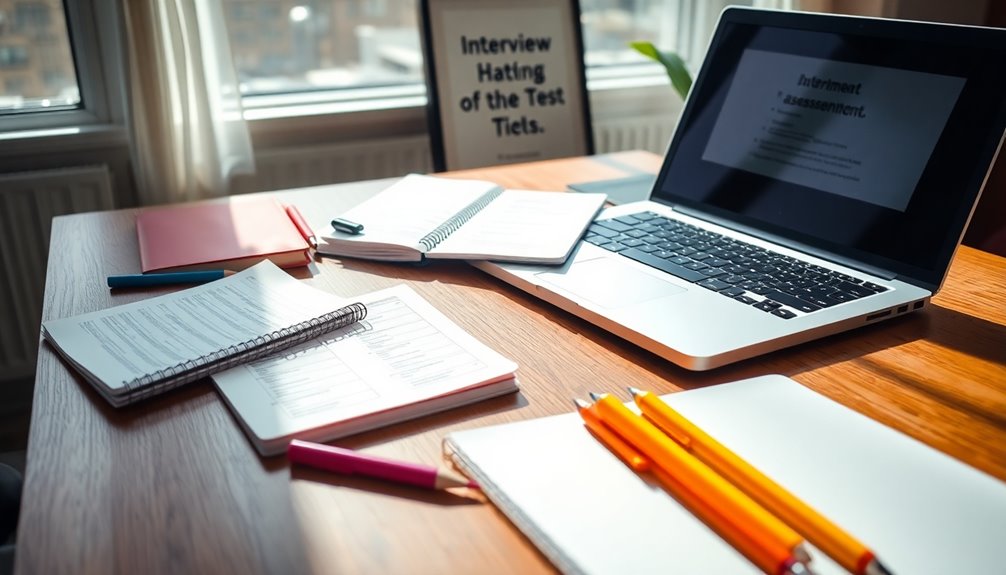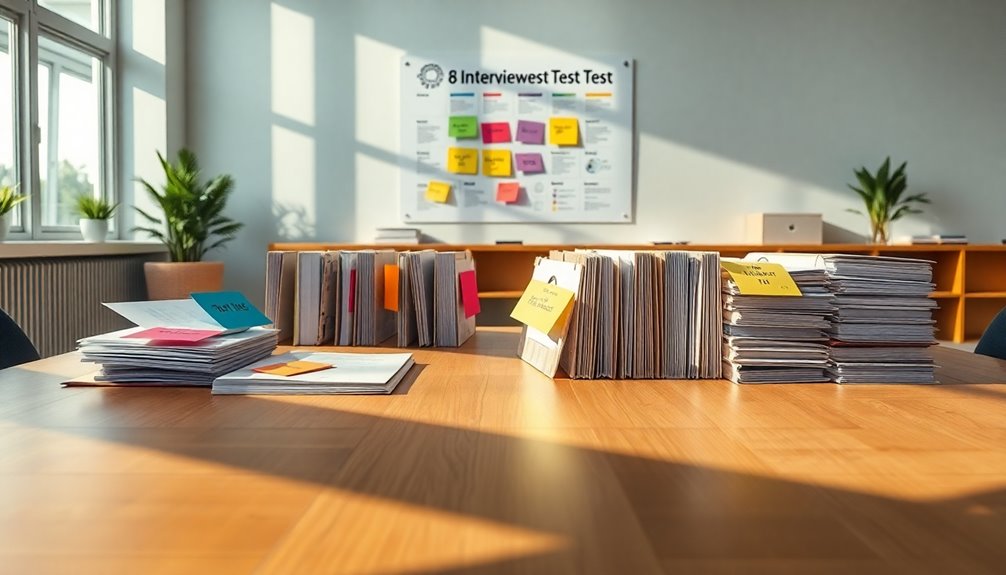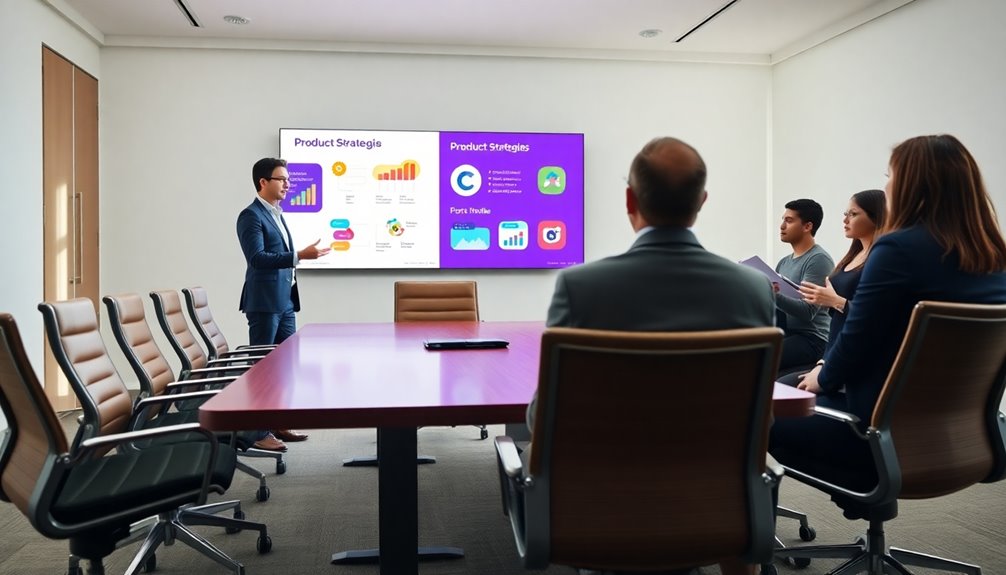To discover key interview test types, you should start by understanding their significance in the hiring process. These tests assess your abilities beyond your resume, evaluating problem-solving, teamwork, and cultural fit. Key types include aptitude tests that measure reasoning skills, personality tests that gauge your communication style, skills assessments focusing on specific competencies, and job simulations that replicate real tasks. Familiarity with these formats can boost your confidence and improve your chances of success. If you're keen to grasp more tips and techniques to master these tests, there's plenty more to explore on this topic.
Key Takeaways
- Aptitude tests assess logical reasoning and problem-solving abilities, often under timed conditions.
- Personality tests evaluate candidates' beliefs and communication styles to gauge cultural fit.
- Skills assessments focus on specific competencies related to the role being applied for.
- Situational judgment tests measure decision-making skills in hypothetical workplace scenarios.
- Job simulation tests replicate real work tasks, allowing candidates to demonstrate their skills in action.
Understanding Interview Tests

When preparing for job applications, understanding interview tests is essential for your success. These assessments evaluate your capabilities and help employers gauge your potential fit for the role.
They go beyond your resume and traditional interviews, offering insights into your skills, teamwork, and leadership qualities. Knowing the types of tests you'll face—like aptitude or skills assessments—can greatly boost your confidence.
Familiarize yourself with the formats and expectations of each test, as this knowledge allows you to prepare effectively. You can practice relevant skills and improve your performance by simulating the testing environment.
Ultimately, mastering interview tests not only enhances your chances of landing the job but also helps you showcase your true abilities to prospective employers.
Importance of Interview Assessments

Interview assessments play an essential role in the hiring process, providing both employers and candidates with valuable insights. They help you gauge your fit for a role while allowing employers to assess skills beyond resumes. This two-way street fosters transparency and aligns expectations.
| Benefits for Employers | Benefits for Candidates |
|---|---|
| Identify top talent | Showcase skills and abilities |
| Reduce hiring risks | Gain insight into company culture |
| Streamline the hiring process | Understand role expectations |
| Assess soft skills and teamwork | Prepare better for interviews |
| Make informed decisions | Build confidence in abilities |
Categories of Interview Tests

In the domain of hiring, interview tests can be categorized into several distinct types, each serving a unique purpose in evaluating candidates.
You'll encounter aptitude or psychometric tests that assess logical reasoning and problem-solving abilities.
Personality tests gauge your beliefs and communication styles, helping employers understand your fit within the company culture.
Skills assessments focus on specialized knowledge relevant to the position, while situational judgment tests measure your decision-making in hypothetical scenarios.
Technical tests evaluate your specific job-related skills, and job simulation tests immerse you in real work tasks, revealing your practical performance.
Understanding these categories can help you prepare effectively, ensuring you showcase your best self during the interview process.
In-Depth Test Explanations

Understanding the nuances of each interview test type is essential for presenting your best self to potential employers.
Aptitude or psychometric tests evaluate your logical reasoning and problem-solving abilities, often under timed conditions.
Personality tests, like the MBTI or DiSC, help employers gauge your fit within their team culture.
Skills assessments focus on specific competencies relevant to the role, such as programming for tech jobs.
Job simulation tests recreate real-world tasks, allowing you to demonstrate your skills in action.
Ultimately, group activities assess your teamwork and leadership potential through collaborative discussions.
Each test reveals different aspects of your qualifications, so knowing what to expect can help you showcase your strengths effectively.
Effective Preparation Techniques

Preparing effectively for interview tests can greatly enhance your chances of success. Start by requesting details about the test types and formats from your prospective employer. Familiarize yourself with each format and practice under similar conditions to build confidence.
Focus on your weaker areas and make improvement a priority. Make sure you're well-rested and nourished before test day to optimize your performance. Understanding the importance of quality assurance in software development will also give you a solid foundation to discuss relevant topics during your interview.
For personality tests, research the ideal profiles for the roles you're targeting, and understand the test structure. If you're facing skills assessments, review the job description to identify key skills, and practice them under timed conditions.
This strategic preparation will help you feel more equipped and ready to showcase your abilities effectively.
Group and Written Assessment Formats

Group and written assessments play a crucial role in the interview process, helping employers gauge candidates' interpersonal and analytical skills. In group activities, you'll collaborate with others to demonstrate your teamwork, communication, and leadership abilities through discussions and role-play scenarios. Meanwhile, written tests often require you to craft essays or reports, demanding clear organization and adherence to grammar rules.
Here's a quick overview of each format:
| Assessment Type | Key Focus |
|---|---|
| Group Activities | Teamwork, communication, leadership |
| Written Tests | Clarity, organization, grammar |
| Role-Play Scenarios | Real-time problem-solving |
| Case Studies | Analytical thinking, collaboration |
Understanding these formats can help you prepare effectively and showcase your true potential. Additionally, developing strong communication skills can enhance your performance during these assessments.
Tips for Success in Tests

Success in interview tests hinges on strategic preparation and a clear understanding of what each test entails. First, familiarize yourself with the specific test formats and requirements. Reach out to employers for details and practice under similar conditions to boost your confidence.
Identify your weak areas during practice and focus on improving them. Make sure you get enough rest and eat well before test day to stay sharp. For personality tests, understand the expected profiles for your target roles.
When preparing for skills assessments, review job descriptions to align your practice with necessary skills. Finally, during group activities, actively engage, communicate clearly, and manage time effectively to showcase your teamwork and leadership abilities.
Frequently Asked Questions
How Do Employers Select Which Tests to Use in Interviews?
Employers choose interview tests based on the specific skills and characteristics they need for a role.
They assess the job requirements and decide which tests best evaluate candidates' capabilities, such as aptitude or personality.
The goal is to gather reliable data beyond resumes to predict success in the position.
Can I Retake an Interview Test if I Am Not Satisfied With My Score?
Imagine sitting in a quiet room, the weight of your test score heavy on your shoulders.
If you're not satisfied with your score, ask the employer about retaking the test. Policies vary by company, and some might allow it, while others may not.
It's crucial to express your willingness to improve and learn, showing your commitment to the role.
What Should I Do if I Have Test Anxiety?
If you're feeling test anxiety, you're not alone. Start by practicing relaxation techniques, like deep breathing or visualization, to calm your nerves.
Familiarize yourself with the test format to boost your confidence. Consider practicing under timed conditions to simulate the real experience.
On test day, make certain you get enough rest and eat well. Remember, it's okay to take a moment to collect your thoughts during the test.
You've prepared, so trust yourself!
Are There Specific Industries That Rely More on Interview Tests?
Yes, specific industries do rely more on interview tests.
For example, tech, finance, and healthcare often use them to gauge technical skills and problem-solving abilities. In these fields, employers want to ascertain candidates possess the necessary expertise and can handle real-world scenarios.
Additionally, roles requiring teamwork and leadership, like management and customer service, frequently use personality and situational judgment tests to assess interpersonal skills and cultural fit.
How Can I Find Resources to Practice for These Tests?
Finding resources to practice for interview tests is like searching for hidden gems in a vast ocean.
Start by checking online platforms offering free practice tests, such as job boards or educational websites. You can also join forums and social media groups where others share study materials.
Don't forget to ask potential employers for recommended resources. Practicing under timed conditions will sharpen your skills and build confidence for the big day.
Conclusion
As you step into the domain of interview tests, think of yourself as an artist ready to paint your future. Each test is a blank canvas, offering you the chance to showcase your unique colors and skills. By understanding these assessments and preparing effectively, you'll transform anxiety into confidence, turning the interview process into a masterpiece. Embrace the journey, and remember: you're not just aiming for a job, but crafting your career's masterpiece!









